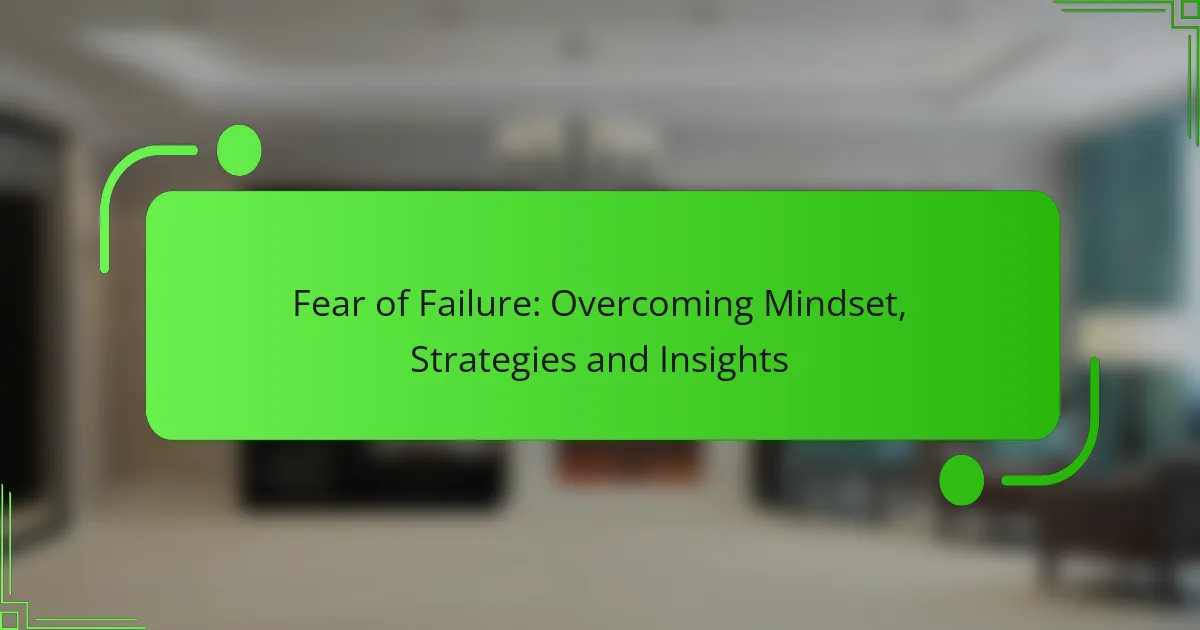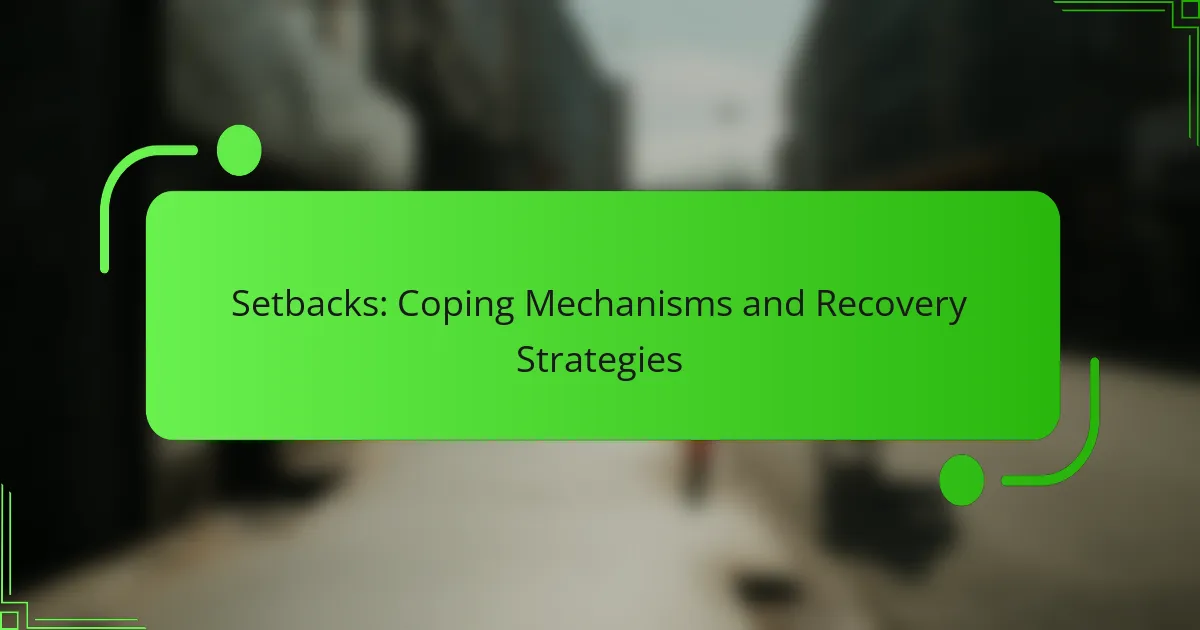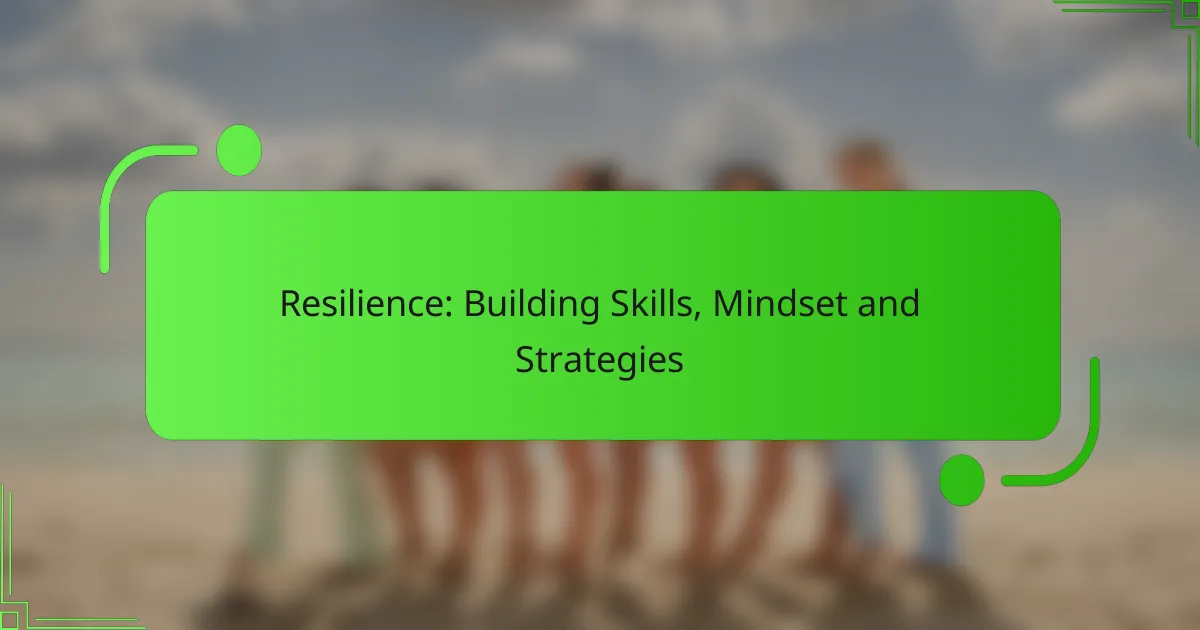The fear of failure can be a significant barrier to personal and professional growth, but it can be overcome with the right mindset and strategies. By shifting your perspective and focusing on resilience, you can transform this fear into a powerful motivator. Implementing techniques such as visualization, breaking tasks into manageable steps, and practicing exposure can help build confidence and foster a more positive approach to challenges.

How can you overcome the fear of failure?
Overcoming the fear of failure involves adopting a proactive mindset and implementing specific strategies. By focusing on personal growth and resilience, you can transform fear into a motivating force.
Mindfulness techniques
Mindfulness techniques help you stay present and reduce anxiety about potential failures. Practices such as meditation, deep breathing, and body scans can ground you in the moment, allowing you to observe your thoughts without judgment.
Start with just a few minutes of mindfulness each day. Apps like Headspace or Calm offer guided sessions that can fit into any schedule. Regular practice can significantly decrease stress and enhance your ability to face challenges.
Goal-setting strategies
Effective goal-setting can mitigate the fear of failure by providing clear, achievable targets. Break larger goals into smaller, manageable steps to create a sense of progress and accomplishment.
Utilize the SMART criteria—specific, measurable, achievable, relevant, and time-bound—to structure your goals. This approach helps clarify your objectives and reduces the overwhelming nature of larger aspirations.
Positive self-talk
Positive self-talk is crucial for overcoming fear of failure. By replacing negative thoughts with affirmations, you can build confidence and resilience. Instead of thinking, “I can’t do this,” try reframing it to, “I will learn from this experience.”
Keep a journal to track your thoughts and identify patterns. Regularly remind yourself of past successes to reinforce a positive mindset. This practice can help shift your perspective and reduce self-doubt.
Seeking mentorship
Mentorship can provide valuable insights and support in overcoming fear of failure. A mentor can share their experiences, offer guidance, and help you navigate challenges more effectively.
Look for mentors in your field or community who have faced similar obstacles. Engaging with someone who has successfully managed their fears can inspire you and provide practical strategies tailored to your situation.
Building resilience
Building resilience is essential for overcoming the fear of failure. Resilience allows you to bounce back from setbacks and view challenges as opportunities for growth. Cultivating a growth mindset, where you embrace learning and adaptability, is key.
Incorporate practices such as reflecting on past failures to identify lessons learned. Surround yourself with supportive individuals who encourage perseverance. Remember, resilience is a skill that can be developed over time through consistent effort and reflection.
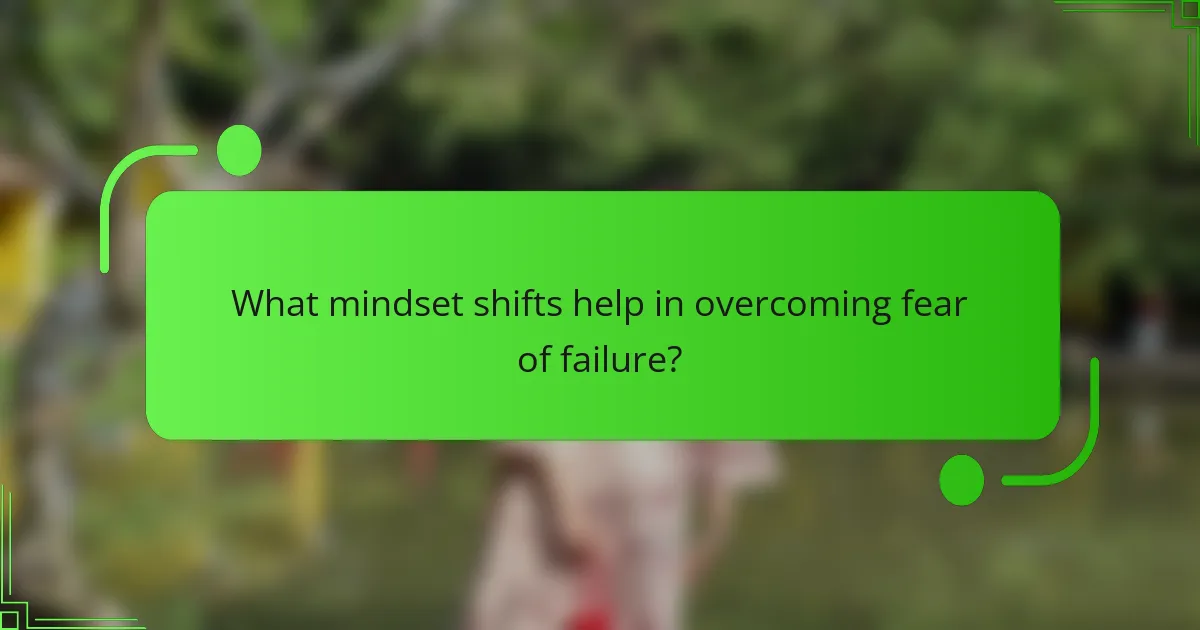
What mindset shifts help in overcoming fear of failure?
Shifting your mindset is crucial for overcoming fear of failure. By adopting new perspectives, you can reduce anxiety and increase resilience in the face of challenges.
Embracing a growth mindset
Embracing a growth mindset involves believing that abilities and intelligence can be developed through dedication and hard work. This perspective fosters a love for learning and resilience, which are essential for overcoming setbacks.
To cultivate a growth mindset, challenge negative thoughts by focusing on your potential for improvement. For example, instead of thinking, “I can’t do this,” reframe it to, “I can’t do this yet.” This small shift can significantly alter your approach to challenges.
Viewing failure as a learning opportunity
Viewing failure as a learning opportunity means recognizing that mistakes provide valuable insights that can lead to future success. Instead of fearing failure, see it as a stepping stone toward growth.
To implement this mindset, analyze what went wrong after a setback and identify lessons learned. For instance, if a project fails, ask yourself what strategies didn’t work and how you can adjust them next time. This practice not only reduces fear but also enhances your problem-solving skills.
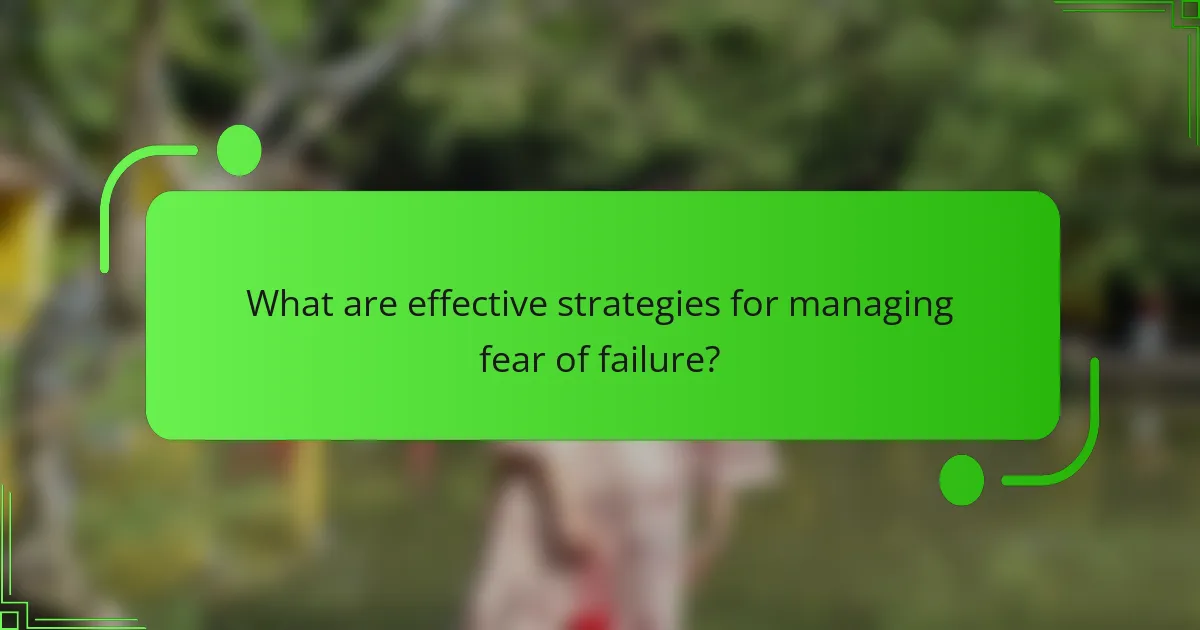
What are effective strategies for managing fear of failure?
Effective strategies for managing fear of failure include visualization techniques, breaking tasks into smaller steps, and practicing exposure therapy. These approaches help individuals build confidence, reduce anxiety, and create a more positive mindset towards challenges.
Visualization techniques
Visualization techniques involve mentally rehearsing successful outcomes to combat fear of failure. By vividly imagining achieving goals, individuals can create a sense of familiarity and confidence, making the actual experience less intimidating.
To practice visualization, find a quiet space, close your eyes, and picture yourself succeeding in a specific task. Focus on the details of the scenario, including your emotions and the environment. Aim to visualize this regularly, ideally daily, for maximum impact.
Breaking tasks into smaller steps
Breaking tasks into smaller, manageable steps can significantly reduce the fear of failure. When large projects feel overwhelming, dividing them into smaller actions makes them more approachable and less daunting.
Start by identifying the overall goal, then outline the specific steps needed to achieve it. For example, if preparing for a presentation, steps might include researching the topic, creating slides, and practicing delivery. This method not only clarifies the process but also allows for celebrating small victories along the way.
Practicing exposure therapy
Practicing exposure therapy involves gradually facing the fear of failure in a controlled manner. This technique helps desensitize individuals to their fears, making them less intimidating over time.
Begin by identifying specific situations that trigger fear of failure, then create a hierarchy of these situations from least to most anxiety-provoking. Start with the least threatening scenario and gradually expose yourself to more challenging situations as you build confidence. This approach can help normalize the experience of failure and reduce its emotional impact.

How does fear of failure impact personal and professional life?
Fear of failure can significantly hinder both personal and professional growth by creating a barrier to taking risks and pursuing opportunities. This mindset often leads to avoidance behaviors that limit potential achievements and satisfaction in various aspects of life.
Effects on decision-making
Fear of failure can cloud judgment and lead to indecisiveness, making it challenging to make choices that involve risk. Individuals may opt for safer, less rewarding options, which can stifle creativity and innovation.
To mitigate this, consider using a decision-making framework that weighs potential outcomes against the fear of failure. For example, listing pros and cons can help clarify the benefits of taking a calculated risk versus the drawbacks of inaction.
Impact on career advancement
In the professional realm, fear of failure can prevent individuals from pursuing promotions or new job opportunities. This reluctance can result in stagnation, as employees miss out on experiences that could enhance their skills and visibility within their field.
To counteract this, set small, achievable goals that gradually build confidence. Seeking feedback and mentorship can also provide support and encouragement to take on new challenges without the paralyzing fear of failure.
Influence on relationships
Fear of failure can negatively affect personal relationships by fostering insecurity and avoidance of vulnerability. Individuals may hesitate to express their feelings or take necessary risks to deepen connections, which can lead to misunderstandings and emotional distance.
To improve relationship dynamics, practice open communication and embrace the idea that vulnerability can strengthen bonds. Engaging in shared activities that involve risk, like trying new experiences together, can also help alleviate fears and build trust.

What role do cultural factors play in fear of failure?
Cultural factors significantly influence the fear of failure by shaping individual perceptions and responses to setbacks. Different societies have varying attitudes towards success and failure, which can either exacerbate or alleviate this fear.
Societal expectations
Societal expectations often dictate what constitutes success, leading individuals to feel immense pressure to meet these standards. In cultures that prioritize achievement, failure can be seen as a personal shortcoming, resulting in anxiety and avoidance behaviors.
For example, in many Western cultures, there is a strong emphasis on individual success, which can lead to a heightened fear of failure. In contrast, collectivist societies may focus more on group success, potentially reducing the personal stakes associated with individual failure.
Family influences
Family dynamics play a crucial role in shaping attitudes towards failure. Parents who emphasize perfectionism or who react negatively to mistakes can instill a fear of failure in their children, affecting their confidence and willingness to take risks.
Conversely, families that encourage resilience and view failure as a learning opportunity can help mitigate this fear. Open discussions about setbacks and celebrating effort rather than just outcomes can foster a healthier mindset towards failure.

How can you build a supportive environment?
Creating a supportive environment involves fostering relationships and spaces that encourage open communication and risk-taking. This can significantly reduce the fear of failure by providing individuals with the confidence to pursue their goals without the fear of negative repercussions.
Encourage Open Communication
Open communication is essential in a supportive environment. It allows individuals to express their thoughts and concerns freely, which can lead to collaborative problem-solving. Regular check-ins and feedback sessions can help reinforce this culture.
Consider implementing platforms where team members can share ideas and challenges without judgment. This could be through team meetings, anonymous suggestion boxes, or digital collaboration tools.
Foster a Growth Mindset
Encouraging a growth mindset helps individuals view failures as opportunities for learning rather than setbacks. This perspective shift can be cultivated through training sessions, workshops, or mentorship programs that emphasize resilience and adaptability.
Highlight stories of successful individuals who faced failures and learned from them. This can inspire others to embrace challenges and view them as part of their personal and professional development.
Provide Resources and Support
Access to resources and support is crucial in building a nurturing environment. This includes providing training, mentorship, and access to tools that can help individuals improve their skills and confidence.
Consider offering workshops on stress management, time management, and other relevant skills. Additionally, ensure that individuals know where to seek help, whether through HR, counseling services, or peer support groups.
Recognize and Celebrate Efforts
Recognizing and celebrating efforts, regardless of the outcome, reinforces a supportive atmosphere. Acknowledgment can come in many forms, such as verbal praise, awards, or team celebrations for milestones achieved.
Establish a culture where effort is valued as much as success. This can encourage individuals to take risks and pursue new challenges without the fear of failure overshadowing their ambitions.
